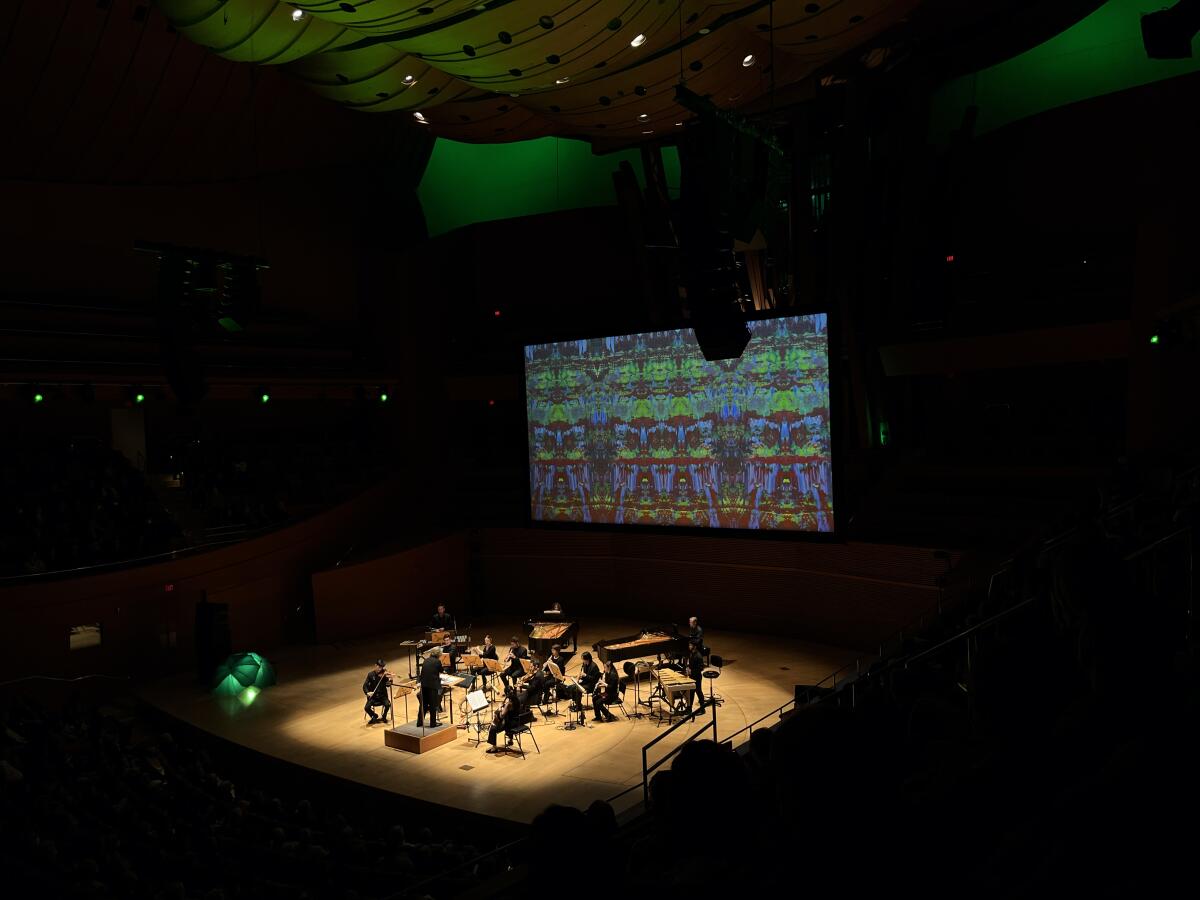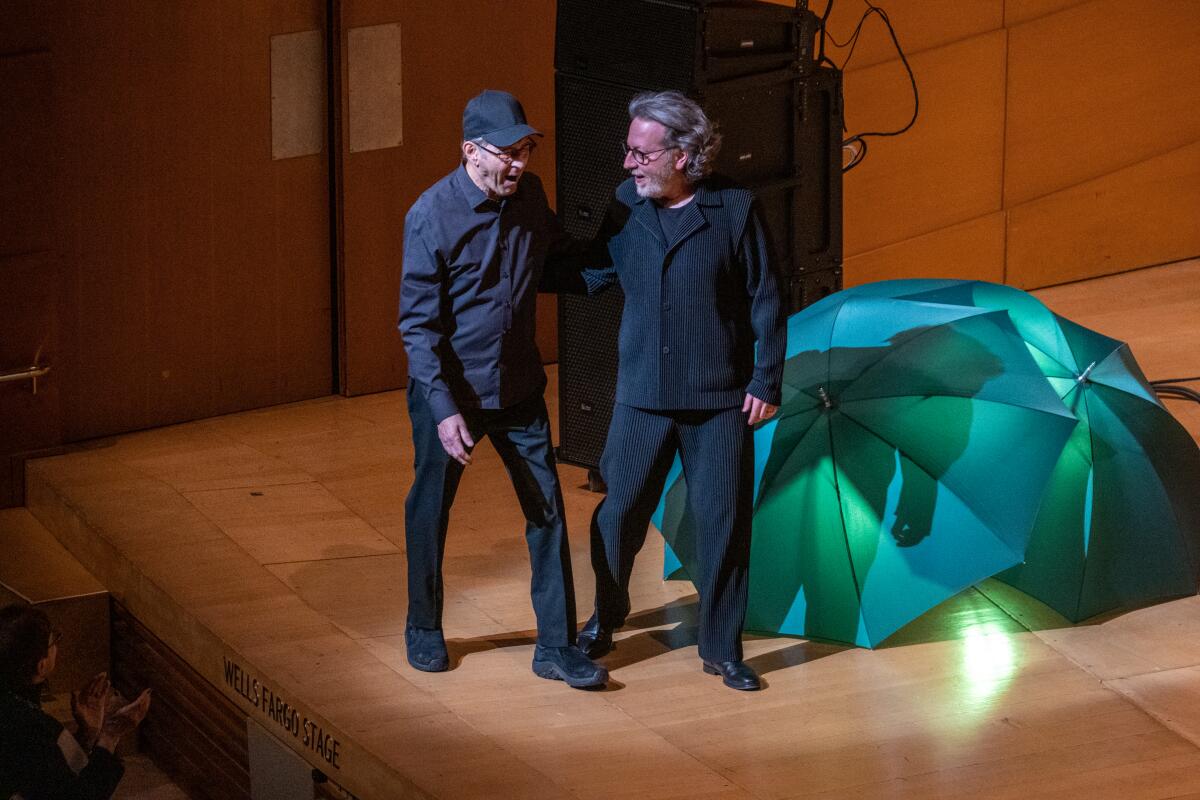Review: Steve Reich remains as vital as ever with a new composition, recordings, book and more

Steve Reich’s music always, and often spectacularly so, knows where it’s going. It may surprise you. Startlingly sudden shifts of meter and/or harmony are a trademark. You might not expect to end up where you finally do. But the scores are impeccably structured. Form is foundational. Compositional technique never falters. Meaning comes out of substance. If you can’t feel the pulse, see a doctor.
Reich is now 86, and his early classics — such as “Drumming,” “Music for 18 Musicians” and “Different Trains” — have been with us for a long time. They have had an enduring influence on modern music (be it classical, pop, jazz and world music), dance and visual art.
All that was apparent when the L.A. Phil New Music Group, conducted by Brad Lubman, dedicated a Green Umbrella concert to Reich at Walt Disney Concert Hall on Saturday night. Unfortunately, though, his influence could not serve as a capstone of the orchestra’s annual community based, 12-hour new music extravaganza, “Noon to Midnight,” as originally planned for the day‘s closing concert. It fell victim to scheduling and whatnot. But Saturday’s Reich concert, which included two important new works, not only stood well alone but also arrived amid a bunch of new Reich recordings and a remarkable book of conversations.
The evening’s obvious showstopper was “Reich/Richter,” a project between Gerhard Richter and Reich. Working with filmmaker Corinna Belz, the German artist made a mesmeric 40-minute film from a book, “Patterns,” of his abstract canvases painted in the 1990s. Richter then turned to the master of musical mesmerism for the movie’s soundtrack, to be performed live by a 14-player chamber ensemble of strings, winds and pairs of vibraphones and pianos.
The eye is amazed at Richter digitally dissecting his paintings, reduced to their pixelated essence. Lines of floating colors slowly materialize onto the screen, like a mandala coming to life. Just before fully resolving into the original paintings, Richter reverses the process. The paintings go back to their original stripes.
If there is anything that defines Reich beyond pulse, it is such patterning. He fractures melodic and rhythmic figures into complex arrays so propulsive that a listener’s mind starts to explode. The sensation is first excitement and then, at its best, not ecstasy but rather a seemingly contradictory spirituality.
Reich doesn’t follow the film literally, other than maintaining a few necessary timing cues. His patterning has a life of its own. About halfway through, the pulse slows down so much that you barely attend to it. Color fields of harmonies saturate the score. One intense chord after another is grippingly sustained, creating a shimmering quality that pervades the hall. The last section is very short. The bouncing meters hastily return. We can’t stay in the mystical wonderland forever, paralyzed by awe. Reich rushes us back to reality as Richter returns to his lines. In Richter, we have resigned, dust-to-dust inevitability. Reich ends with a bang.
What does it all mean? A Los Angeles Philharmonic co-commission, “Reich/Richter” was supposed to have been performed here shortly after it was composed in 2019. That got delayed by the COVID-19 pandemic, during which Reich wrote “Traveler’s Prayer” for two sopranos, two tenors, two vibraphones, strings and piano.
At a time when no one was going anywhere, Reich turned to the Jewish traveler’s prayer, something that might be recited before boarding an airplane, as a trip to possibly other, unknowable realms. Each of the three sections is based on a Hebraic chant — two of which are traditional and one original — and adapted texts from Exodus, Genesis and Psalm 121.
Here, the traveler seeks divine protection. The tone of the score, from first note to last, is sustained sublimity. Nothing is said or indicated of the pandemic. But nothing I’ve heard comes as close to capturing the sense of strangeness, the changed world in which clock time lost its dominance or the dramatic lessening of our usual distractions that forced us to pay new attention to our surroundings.
For Reich, the chant tunes become sources of fascination. He employs them forward and backward, right side up and the notes upside down, the way the medieval musicians he adores once did (and the way Schoenberg, whom he doesn’t adore, also did). He proceeds with the contrapuntal logic he never leaves home without. Yet he also gives up some of his ego to the material, letting it develop with the freedom it needs.
The high voices offer sweetness and cheer. Yet this is relatively slow music throughout, a novelty for Reich, and the pulse, though there, doesn’t blow your mind. At the premiere in Amsterdam in 2021, which was streamed live, “Traveler’s Prayer” suggested Monteverdi made new. That performance lasted close to 17 minutes.

For the record:
4:30 p.m. April 6, 2023An earlier version of this article listed Leela Subramaniam as a singer in the Saturday performance. The singer was Holly Sedillos.
On Saturday, as interpreted by Lubman and the L.A. Phil musicians (the singers were Holly Sedillos, Ashley Fabian, Arnold Livingston Geis and Edmond Rodriguez), the timing was close to 12 minutes. Oddly, it still felt like slow music, but it sounded like nothing else old or new. At times, it sounded as if strings could have been the singers, and the singers the strings. The vibraphones and piano added shine. The richness of sound proved heart-stopping prayer. During intermission, I asked Reich about the new tempo. He very much approved.
Reich is no mystic. His music is direct and calculated. You could say the same about Bach, who found the divine in whatever resources he had at hand. “Traveler’s Prayer” finds it in Reich’s profound response to basic chants and melodies. And the L.A. Phil timing happened to be impeccable, with Passover and Easter at hand. May this become a tradition.
The program began with a joyous performance of a joyous earlier piece, “Double Sextet.” Saying that is as much a tribute to Lubman and the L.A. Phil as it is to the composer. Reich has historically had an uneasy relationship with orchestras. The music can seem almost impossible to count. And then there is Reich’s love of aggressive amplification, which was modest and warm this time. But unlike few others, the L.A. Phil has been performing his work since the 1980s. And for the younger musicians, his rhythmic demands have become natural and, better still, loving.
As an example of how younger classically trained musicians now turn to Reich, the Colburn Contemporary Ensemble will perform his hour-long “Music for 18 Musicians” at Zipper Hall on Thursday. As an example of just how well the L.A. Phil plays Reich, there is the orchestra’s outstanding recent Nonesuch recording of “Runner” and “Music for Ensemble and Orchestra,” conducted by Susanna Mälkki. That joins Colin Currie’s cheerful forthcoming recording of “Music for 18 Musicians,” Ensemble Links’ exuberant take on “Drumming” and the Mivos Quartet’s suave survey of Reich’s three strings quartet.
And to make sense of it all, there is “Conversations.” Rather than an autobiography, the book articulately and bracingly shows Reich engaging in engrossing dialogues with a variety of interviewers, including conductor Michael Tilson Thomas, Broadway icon Stephen Sondheim, Radiohead’s Jonny Greenwood, Belgian choreographer Anne Teresa De Keersmaeker. It’s a kaleidoscopic portrait of Reich from 19 different angles, all illuminating and all very much him.
‘Music for 18 Musicians’
Where: Zipper Hall, the Colburn School, 200 S. Grand. Ave. and livestreamed
When: 7 p.m. Thursday
Cost: $15-$30; $10 livestream
Info: (213) 621-2200 or colburnschool.edu
More to Read
The biggest entertainment stories
Get our big stories about Hollywood, film, television, music, arts, culture and more right in your inbox as soon as they publish.
You may occasionally receive promotional content from the Los Angeles Times.











